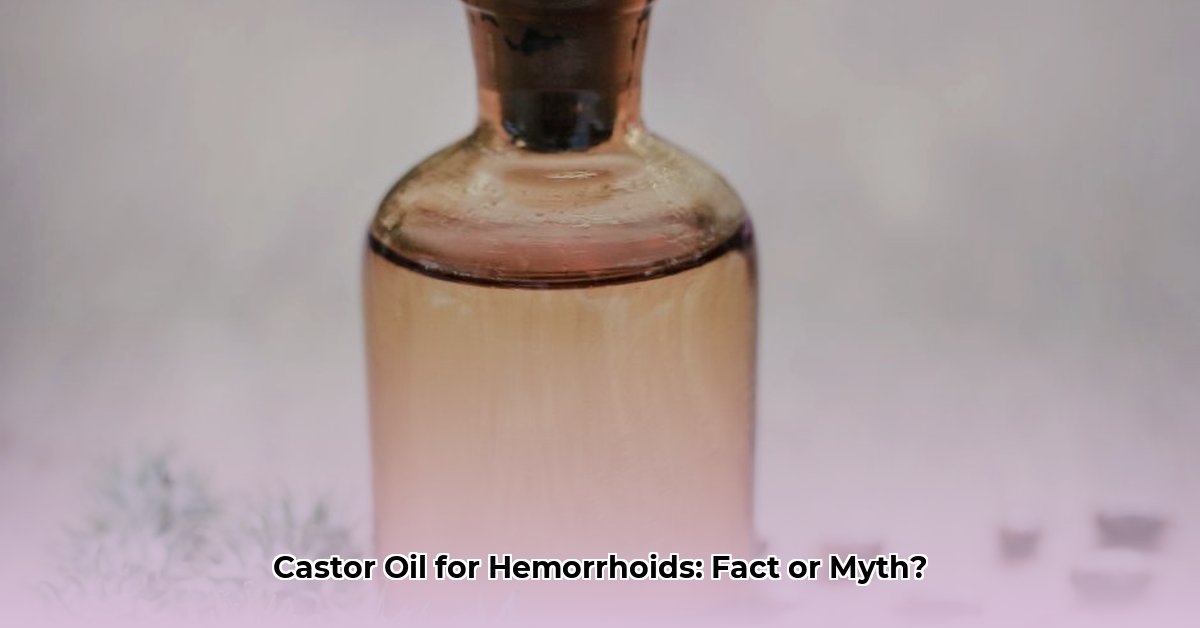Hemorrhoids can be a painful and uncomfortable experience. Many people explore home remedies for relief, and castor oil is one you’ll frequently encounter. This guide provides evidence-based information about castor oil for hemorrhoids, including its potential benefits and risks, and how to use it safely. It’s important to remember that this information is for educational purposes only and does not substitute professional medical advice. Always consult a healthcare professional before starting any new treatment, especially if you are pregnant, breastfeeding, or have other health concerns.
Understanding the Potential Benefits of Castor Oil
Castor oil contains ricinoleic acid, a unique fatty acid believed to possess anti-inflammatory and analgesic properties. This suggests that ricinoleic acid may help reduce the swelling and pain associated with hemorrhoids. Additionally, castor oil’s lubricating texture could potentially ease bowel movements, minimizing further irritation of hemorrhoids. However, it’s crucial to note that robust scientific evidence supporting these benefits for hemorrhoid treatment is still limited. Further research is needed to confirm these potential effects.
How to Apply Castor Oil Topically
If you’re considering using castor oil for hemorrhoids, topical application is the recommended method. Here’s a step-by-step guide:
- Cleanse the Area: Gently wash the affected area with mild soap and water. Pat it dry thoroughly with a soft towel.
- Choose the Right Oil: Select pure, cold-pressed, hexane-free castor oil for topical application.
- Apply Carefully: Pour a small amount of castor oil onto a clean cotton ball, soft cloth, or a folded piece of toilet paper. Gently dab the oil onto the external hemorrhoid, avoiding rubbing or excessive pressure.
- Consider a Barrier: To protect your clothing from stains, place a clean sanitary pad or cloth over the area after applying the oil.
- Reapply as Needed: You can typically reapply castor oil several times a day, especially after bowel movements.
Internal Use: Not Recommended
Although some sources suggest ingesting castor oil for constipation, it’s generally not recommended for hemorrhoids. Oral consumption of castor oil can cause diarrhea, which could exacerbate hemorrhoid symptoms. If constipation is a concern, consult your doctor for safer and more effective solutions.
Potential Side Effects and Precautions
While generally considered safe for topical use, castor oil can sometimes cause mild skin irritation or allergic reactions in some individuals. Before applying it broadly, perform a patch test on a small area of skin. If you’re pregnant or breastfeeding, consult your healthcare provider before using castor oil.
Alternative Treatments for Hemorrhoids
Castor oil isn’t the only option for hemorrhoid relief. Other potential remedies include:
- Witch Hazel: Applying witch hazel to the affected area may help reduce swelling and itching. You can find witch hazel pads at most drugstores.
- Sitz Baths: Soaking the anal area in warm water for 10-15 minutes several times a day can provide soothing relief.
- Over-the-Counter Creams and Ointments: Several over-the-counter products are specifically designed to relieve hemorrhoid symptoms. Look for creams containing hydrocortisone or lidocaine.
- Fiber Supplements: Increasing your fiber intake can soften stools and reduce straining during bowel movements, which can help prevent hemorrhoids.
Lifestyle Changes for Hemorrhoid Prevention
In addition to topical treatments, certain lifestyle changes can help prevent and manage hemorrhoids:
- High-Fiber Diet: Consume plenty of fruits, vegetables, and whole grains to promote regular bowel movements.
- Hydration: Drink plenty of water throughout the day to keep stools soft.
- Regular Exercise: Physical activity can help improve bowel function.
- Avoid Straining: Don’t strain during bowel movements. If you’re having difficulty, try using a stool softener.
When to Seek Medical Attention
While home remedies can be helpful for mild hemorrhoids, it’s essential to seek professional medical advice if your symptoms:
- Persist for more than a week.
- Worsen or become severe.
- Involve bleeding.
Your doctor can diagnose the underlying cause of your hemorrhoids and recommend the most appropriate treatment plan, which might include prescription medications or minimally invasive procedures.
Frequently Asked Questions (FAQ)
-
How long does it take to see results with topical castor oil? The time it takes to experience relief can vary. Some individuals may notice improvement within a few days, while others may not experience any significant changes.
-
Can I combine castor oil with other hemorrhoid remedies? It’s always best to consult your doctor before combining castor oil with other treatments, including over-the-counter medications or other home remedies.
-
What should I do if I accidentally ingest a large amount of castor oil? Contact a medical professional or a poison control center immediately.
Disclaimer: This information is intended for educational purposes only and does not constitute medical advice. Always consult with a qualified healthcare professional for diagnosis and treatment of any health concern.
- Best Mindfulness Books for Anxiety, Sleep, and Daily Peace - January 29, 2026
- Books On Mindfulness For A Happier, More Present Life - January 28, 2026
- Essential Meditation Books for Beginners and Experienced Practitioners - January 27, 2026
















